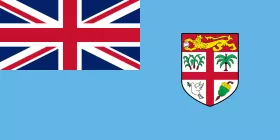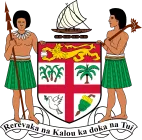Fiji

Geographical Location of Fiji
Fiji is an archipelago of more than 300 islands, of which just over 100 are permanently inhabited. The country is the most populous of the island nations in the Pacific Ocean. The largest islands are volcanic in origin, while many of the smaller ones are flat coral islands (atolls) rising above the sea. Fiji has a tropical maritime climate with plenty of rain. The southeast trade wind moderates the humid heat and maintains stable temperatures throughout the year.
Fiji is extremely vulnerable to climate change and is therefore actively involved in the global fight against it. Many islands are several meters above sea level and are in danger of disappearing as sea levels rise. Because atolls are flat, a slight rise in sea level can cause large areas to disappear underwater. In addition, salt water penetrates the ground and destroys fertile soil and groundwater. Climate change is also leading to more extreme weather conditions, with Fiji experiencing an increase in droughts as well as hurricanes and cyclones in recent years. Rising sea temperatures are threatening coral reefs around the islands, and just one-degree rise in temperature is enough to kill corals. As a result, many fish lose their habitat, and people are deprived of an important source of food. The air in the country is characterized by pollution due to the burning of garbage and vehicles. Deforestation and soil erosion from slash-and-burn agriculture also create environmental problems and threaten biodiversity.
Brief History of Fiji
Most of Fiji's islands were formed by volcanic activity that began about 150 million years ago. Fiji's original population came from the northern islands of Melanesia over 3,500 years ago and is called Itaukei. At the end of the 18th century, Europeans began to negotiate with the population, practically devastating the sandalwood islands in exchange for firearms. Trade with Europeans led to several tribal wars in the 19th century. During these wars, the Bau kingdom grew until all of Fiji was united for a short period from 1871 to 1874. After this, the country was a British colony until 1970. After independence, Fiji became part of the Commonwealth of Nations.
When Fiji became a British colony, the agreement was that the British and other Europeans were not allowed to use the population as labor, and the British brought in contract workers from India. When the indentured labor system ended in 1916, many Indians remained in the colonial state. The indigenous Fijian population lived in better social and economic conditions than the Indian population, which caused discontent.
The ethnic conflict between Itaukea and the Indians was very noticeable in politics during the years of the independent state. After independence, the Itaukian Alliance Party ruled the country until it lost elections in 1987. The Indians then won a majority in parliament for the first time, but the government was immediately overthrown by a military coup. After this, many Indians emigrated.
Since then, there have been three more military coups, the most recent in 2006. After six years of military dictatorship, Fiji was forced to democratize the regime. However, it was established by law that the military could not be punished for human rights violations it committed. The first democratic elections in eight years were held in 2014, and the Fiji First party won with a landslide majority. The party also won in 2018.
Society and Politics of Fiji
Fiji is a democratic republic with a president and a prime minister, where the prime minister has real power. Fiji has a parliamentary system, with legislative power vested in the National Assembly. The National Assembly also elects a president for a three-year term. The Prime Minister is the head of government and selects governments based on the members of the National Assembly.
Since 1970, the country has had four different constitutions, the most recent of which was adopted in 2013. Previous constitutions gave ethnic Fijians advantages over the Indian-origin population, but the current constitution states that all citizens are equal before the law, regardless of ethnicity. Fiji's politics are marked by ethnic divisions between the indigenous Itaukei and Amerindians. The former is in power and in the majority, and there is little chance of Indians gaining political influence. The military wields great political power, and the leaders of the three main political parties have military backgrounds. In addition, corruption is a serious problem in the police.
Given the size of the country, Fiji is very active in UN peacekeeping operations. It had previously been criticized by Australia and New Zealand due to the country's military dictatorship. As of 2020, more than one-eighth of military personnel are deployed overseas.
Fiji is one of the most developed countries among the Pacific small island states, but political unrest has contributed to rising poverty and unemployment. Since Fiji became a democracy in 2014, more people have found work, but one in eight people in work lives in poverty.
Economy and Trade of Fiji
With beautiful scenery and clear water, Fiji is a magnet for tourists. Tourism is the country's most important economic sector, accounting for about 40 percent of the gross domestic product and providing employment to the majority of people. Almost 900,000 tourists visited Fiji in 2019, the same number as the country's population. The tourism industry suffered a sharp decline following political instability in 2009, but since the transition to democracy, visitor numbers have surpassed previous records.
Agriculture and fishing contribute about 14 percent of GDP, and two out of five workers in the country work in agriculture. Fiji also has natural resources, with minerals such as gold, silver and copper important to the economy. Additionally, bottled water is the largest export commodity, followed by sugar, but the government does not make as much money from water because it is not heavily taxed. The country spends more on imports than it earns from exports.
Fiji's high participation in UN peacekeeping operations also contributes to the country's economy as they receive financial compensation for the soldiers they provide.







